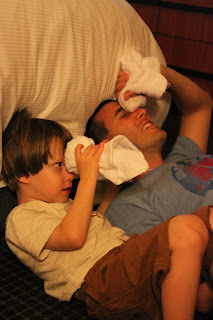I've been missing my Papa a lot this week. I blame it on my cold-medicine dreams. Three nights ago he showed up in one and told me he didn't remember where he'd been for the past 12 years, but he'd woken up in a strange hospital and now he was all better and happy to be home and he'd missed me so much. And of course he hadn't died- what silly thing for me to think. Then we went to a huge celebration dinner for him, and I stuck to his side like glue and laughed conspiratorially as he made fun of all our strange cousins.
Don't dreams like that really get to you? I'm grateful for them because I really do get see him again, hear him call me "Dear", remember his mannerisms and crooked fingers. On the other hand, my subconscious was being a real mean bully with the whole death-was-just-a-misunderstanding thing.
But I really don't want this to be a sad, wallowing post. I just want to remember him.
This may be a weird thing to share, but when I took a creative writing class four years ago, one of our first assignments was to create a character profile based on someone we knew. I chose Papa. There's a wee bit of language so forgive me. Papa was a WWII sailor.
Ed Swanson saw nothing dangerous or illogical about his plan. The roof needed to be fixed, and he was perfectly capable of doing it himself. When a curious neighbor or concerned family member asked why he wouldn’t hire help or at least rent the proper equipment, his Swedish blue eyes shined. “Awww, what would be the fun in that?”
And so, in order to reach the summit of the roof, the 72-year-old climbed nearly three stories to the top rung of a 20-foot extension ladder that, in turn, was precariously balanced inside the raised front bucket of a commercial-grade tractor. With thick, work-beaten hands he replaced screws and applied patches to the barreled fiberglass structure that covered his swimming pool. He worked each day for as long as the sun would keep him company, coming down only for lunch and “nourishment”, his euphemism for Budweiser.
Sweat soaked through his pale blue Dickie coveralls and beaded up on his bald head, which he protected from the sun with a same-pale-blue bucket hat. He owned one suit (for his future burial, he said), a few dress shirts and slacks, some bolero ties, and 23 pairs of coveralls in five colors, which he always matched to his hats. His wardrobe was utilitarian but not shabby. If he tore a pant leg, he sat at his sewing machine and carefully mended it, and he starched and ironed his bucket hats so that the brim stood out straight and didn’t flop. Even his hats were hardworking.
He’d had the pool installed twenty years before at the suggestion of his wife’s doctors. Rheumatoid arthritis had knotted her joints and gnarled her hands and feet, and Ed hoped soaking in a heated pool would give her some relief from the pain. She’d been gone nearly a decade now, but even death could not earn her a reprieve from Ed’s blunt honesty. “Margie was a pain in the ass! Always complaining. Never supporting me in anything I wanted to do,” he’d say with such weariness that it seemed he had just been arguing with her. And yet the piles of discarded Kleenex, which regularly appeared by his bed and on the kitchen hutch, were a testament to how much he still missed her.
Once he finished the roof repairs and it was time to move the tractor back to the shed, Ed would feel a little melancholy. His projects were his babies, and he always experienced a kind of postpartum depression following hard labor that only a new project could cure. Previous cures varied from major home remodels to building a catwalk for the squirrels when they were having trouble reaching their feeder. And cures didn’t have be physical – he craved a mental challenge too. His college-age granddaughter once lost out on resale profits when he took her statistics and astronomy books. The former served as a resource in his quest to win the Texas lottery. He constructed a frequency distribution table that spanned four years of drawings and began to regularly predict three or four of the six drawn numbers. The latter fueled his fascination with sky and space. “Did you notice those Hubble shots? The gaLAXies are gorgeous!” (He had an endearing habit of emphasizing the wrong syllables in words when he was excited.)
Ed read the entire Bible, Qur’an and Book of Mormon but ultimately decided to keep God and dump religion. He attached a brush hog to his tractor, cut a path through the woods behind his house and called it his church. He took prayer walks there twice a day. Others were welcome to join him on the condition that they remain quiet. His was not a charismatic church.
Everywhere else, though, Ed greatly valued conversation and company. He often invited his daughter and granddaughters for a breakfast of twelve-grain toast and coffeemilk over which they spent hours talking and laughing in his tiny kitchen. And an evening drink by the pool with friends was the perfect reward for surviving a day of kamikaze roofing. Once fully “nourished”, he’d stand, tuck his arms and do the twist as he sang “C’mon baby, let the good times roll…”
I think my instructor liked the piece okay. But she said the last line felt really contrived. I found that funny, because I didn't have to contrive anything. He really did that. And fairly often. I imagine Papa would have liked that a writing teacher found him stranger than fiction.













































